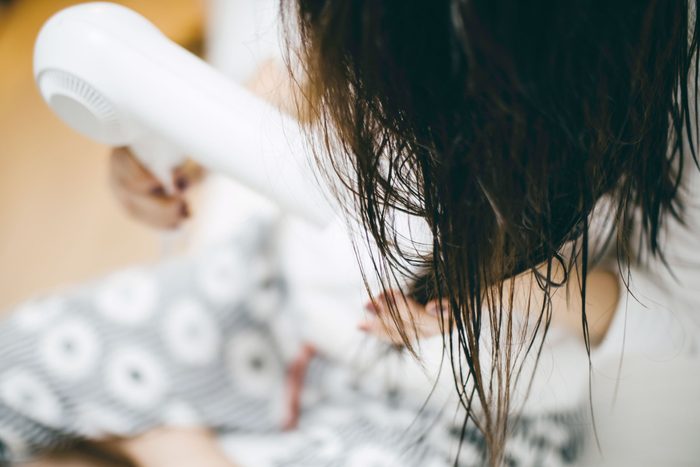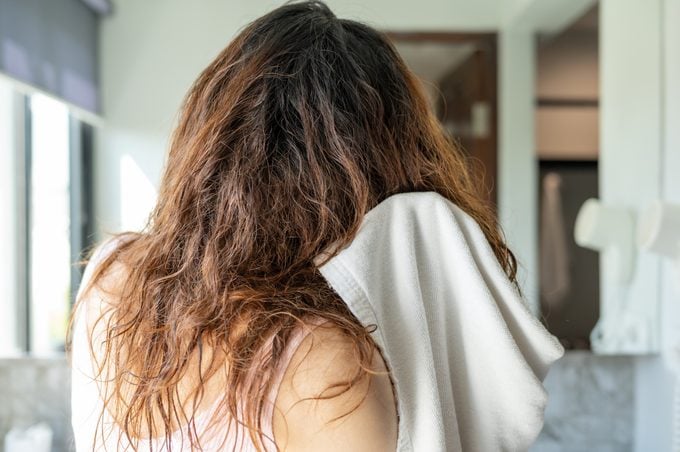Here’s Why You Shouldn’t Go to Bed With Wet Hair
Updated: Aug. 16, 2023

It may seem harmless, but going to bed with wet hair can cause a lot more damage to your hair—and scalp!—than you may think.
Sometimes after a long day, a warm, soothing shower (or bath!) before hitting the hay sounds like a dream. Of course, after slathering on your favorite soaps or enjoying that bath bomb, you run the risk of suddenly being too tired to wait for your hair to dry—or to blow dry it yourself—before tucking in. But will going to bed with wet hair damage your luscious locks?
Unfortunately, while going to bed with wet hair may seem harmless, it can hurt not only your hair, but even the health of your scalp. We spoke with Rachel Ealden, hair care expert, stylist, and owner of More Changes Hair Salon in Southeastern Connecticut, about what exactly happens when you go to bed with wet hair, and solutions to make sure it stays healthy.
What Is Hair Cycling, the Latest Viral Trend?
Why sleeping with wet hair can cause damage
According to Ealden, there are three major reasons why you shouldn’t go to bed with wet hair at the end of the day.
“First, it makes your hair more fragile and prone to breakage,” she says. “People don’t realize it because it’s just wet hair and it’s not that bad. But that can be one, especially depending on the texture of your hair.”
Second, Ealden points out that wet hair can also lead to a build of bacteria. “In wet, moist conditions, bacteria thrives,” she explains. “You could get a buildup on your scalp.”
According to Cleveland Clinic, there are three different types of bacteria that can thrive if you’re going to bed with wet hair: Malassezia folliculitis, an itchy acne-like condition that is caused by a yeast infection around the hair follicles; Aspergillosis, a mold commonly found on pillows from bacteria buildup that can cause respiratory problems; and scalp ringworm, a fungal infection that causes a red, itchy ring on the head that can spread and cause bald spots.
This Is What Your Hair Color Reveals About Your Health
The same is also true for hair that is put up while it is still wet. Even though tying your hair into a ponytail or twisting it into a claw clip will give you a sleek look when it’s wet, it still creates a moist environment for bacteria that could be damaging your hair. Ealden points out that she sees this type of moisture buildup often with her clients.
Lastly, Ealden also says she will often find dandruff in people who don’t let their hair fully dry—either before bed or before styling for the day. “It can also lead to dandruff or itchiness, even dryness actually,” she says. “And then another factor is just skin irritation.”
Unfortunately, having a constant dry, itchy scalp can have its consequences. According to the University of Central Florida Health, seborrheic dermatitis (a condition that breeds from Malassezia yeast) is a fungal disease that can cause you to itch like crazy, which can damage your hair follicles and can even hinder hair growth. This type of condition needs medical attention and treatment options from a dermatologist and a hair care professional.
Here’s How Often You Should Really Shower, Say Doctors
Myths about sleeping with wet hair

Going to bed with wet hair tends to be linked with two common myths regarding the health of your precious mane, the first having to do with your chances of getting sick.
Thankfully, this is an old wives’ tale. Cleveland Clinic experts state that wet hair at night will not increase your chances of getting sick, though it will increase your chances of obtaining a fungal infection on the scalp.
Secondly, the idea that going to bed with wet hair will make it greasy is also a myth, according to Ealden.
“No. It’s mostly just like itchiness and dryness and then it can cause bacteria,” she says. “Honestly, I don’t even find it comfortable to go to sleep with wet hair.”
Instead, according to Dr. Rosmy Barrios, MD, medical advisor for the Health Reporter, greasy hair is actually a sign of poor hygiene and is a result of bacteria build up in the hair. It is also a common symptom of seborrheic dermatitis.
An MD Lists the 5 Warning Signs You Have Bad Hygiene
The healthiest way to take care of your hair before bed
So does this mean it’s bad to wash your hair at night? Is there a better time to wash your hair during the day? In truth, Ealden says it doesn’t matter—as long as you’re letting your hair dry thoroughly.
“I don’t think that makes a difference,” she says. “I think the main thing is if you do wash it at night to make sure that you’re drying it. So it’s good for the hair after you wash it, to let it completely dry or at least blow dry it before putting it up or doing anything with it.”
Once your hair is dry, is there a healthy way to protect it while sleeping? Ealden says that it all depends on the texture you’re working with.
“If you have smoother hair and not excessively curly hair, there’s a difference,” she explains. “So someone with thick hair, they’re gonna wear a silk scarf or something around their head. But if your hair is fine, you would want to go to bed with dry hair. I suggest sometimes too, if you don’t want it to get unruly, maybe braid it before bed.”
- I Did Everything My Smart Watch Told Me to Do for a Month—Here’s What Happened
- The #1 Best Way Respond When Someone Unfriends You, According to an Expert on Psychology & Social Media
- 10 Skin Care Changes You Should Make Before Summer, from Dermatologists
- 5 Habits That Secretly Annoy the Staff at Your Gym

















